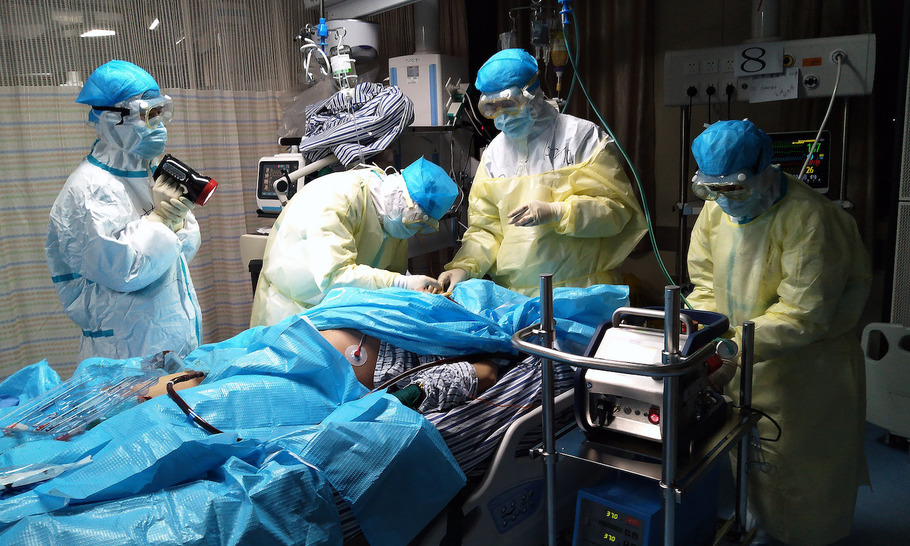At the national, European and global levels, Covid-19 is a test of statesmanship

Xianghu Hospital in Nanchang, Jiangxi Province, Feb. 6, 2020. (Xinhua/Wan Xiang)
A great deal has happened since the last Cobra meeting a week ago. Today’s will take place against a backdrop of mortality figures that are now escalating by leaps and bounds, as the coronavirus crisis tightens its grip on the British population. This is the moment of maximum danger, when it is essential for the authorities to keep their nerve.
After a wobble or two over the weekend, the advice to the public seems clear. The over-70s are being asked to stay at home if possible, while the rest are learning to protect the vulnerable by social distancing. British policy on Covid-19 no longer looks quite as different from other countries, but it is still based on persuasion rather than coercion.
Amazingly, some people are still attempting to travel abroad, but this is increasingly difficult because airlines are shutting down flights. There are even negotiations with the Government to bring stranded British citizens home by chartered flights. Airports in any case are among the least salubrious places to be during a pandemic.
It is good news that there will now be a daily televised briefing by the Government and its scientists to keep the public directly informed in as transparent a fashion as possible. Rightly, a consensus has emerged that briefing off the record to favoured outlets is bad practice and leads to confusion. The old wartime slogan “careless talk costs lives” applies as much to Covid-19 now as it then did to espionage.
The priority now has to be to increase the capacity of the NHS to cope with those who fall seriously ill with acute respiratory distress syndrome (ARDS) arising from coronavirus. Only a minority of patients will develop this lung condition, but they will require ventilators to keep them alive. Matt Hancock, the Health Secretary, plans to almost double the number of acute beds fit for this purpose from 4,500 to 8,000, but clearly even the higher figure is unlikely to be sufficient. Ventilators are in demand the world over, so it is down to domestic industry to manufacture and supply the equipment in short order. It will quickly become clear whether this is possible, or whether there are crucial components that need to be imported. In the latter case, otherwise closed borders should not be impermeable.
The European Union has so far done very little even for member states, let alone former ones. In Italy, public opinion has turned sharply against the EU, with 88 per cent of Italians saying that the Union has not helped Italy in the crisis. However, there is an opportunity here for the EU to coordinate efforts to supply hospitals across Europe with ventilators and other vital equipment. One would hope that trade barriers between member states and their neighbours would not be an obstacle where lives are at stake.
On the world stage, there is, of course, one country that dominates medical innovation and pharmaceutical supply chains: the United States. Already, the financial resources of American philanthropy are combining with the intellectual strength of the high tech industries to produce solutions to the problems posed by the pandemic. Once breakthroughs begin to take place, it is vital that new drugs are shared globally. The profit motive is essential to produce technological results, but there must be a political effort to socialise the costs not just on a national but an international scale, so that poorer countries are not excluded. This is in the interest of the richer countries, too.
We await the latest developments in these and many other areas with alarm and anxiety. Ministers should bear in mind that their job is to mitigate that anxiety at the same time as telling the public the unvarnished truth. Honesty is the best policy, but the essence of statesmanship lies in explaining unpalatable news in such a way as to strengthen national unity. This is not a question of rhetorical display, but of taking the nation into the confidence of its leaders. Misunderstandings of phrases such as “herd immunity” only arise when the public feels shut out of the conversation among the experts. The job of ministers, above all the Prime Minister, is to talk the public through each stage of the strategy and tactics of the campaign,. This is the task for which Boris Johnson was born. The coming days will demonstrate just how prime ministerial our Prime Minister can be.





